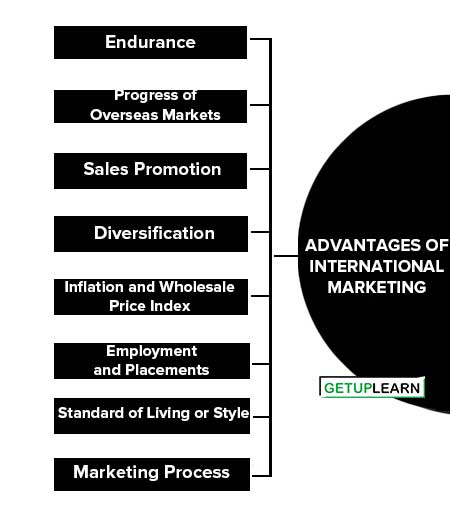The advantages of international marketing are neither understood nor appreciated by consumers though they are carrying out international marketing daily. Government officials, especially bureaucrats, always point out a negative aspect of international business.
Many of their charges on international marketing are more imaginary than real. Hence, the benefits of international marketing must be explicitly discussed.
Table of Contents
Advantages of International Marketing
These are the advantages of international marketing:
- Endurance
- Progress of Overseas Markets
- Sales Promotion
- Diversification
- Inflation and Wholesale Price Index
- Employment and Placements
- Standard of Living or Style
- Marketing Process

Endurance
Every country is less fortunate than America in terms of infrastructure, size, resources, and opportunities. Hence, they must trade with other countries to survive. Similarly, every country is not as fortunate as India, which has abundant natural resources and a treasure of bio-diversity that it can survive within its resources even if there is a resource crunch.
Even then it has to carry out trading with other countries to get oil and armaments for its survival. Hong Kong cannot survive without food and water from China. The countries of Europe have had similar experiences since most European nations are relatively small in size.
Without a foreign market, European firms would not have sufficient economies of scale to compete with US firms. Switzerland lacks natural resources, forcing it to depend on trade and adopt the geocentric perspective.
Similarly, Japanese firms are dependent on raw materials from other countries but they have better technical know-how as a result of which they are the world leaders in the electronics and software industry.
Progress of Overseas Markets
Developing countries, in spite of a poor economy with serious marketing problems, are excellent markets. The US has found that India is the biggest market in the world for consumer and engineering products. According to a report prepared by the US Trade Representative US Congress, Latin America and Asia are experiencing the worst economic recession though they have potential in the world market.
The Conference Board‘s study of some 1500 companies found that US manufacturers, with factories or sales subsidiaries overseas, outperformed their counterparts during the 1980s in terms of growth in 19 out of 20 major industrial groups and higher earnings in 17 out of 20 groups.
American market cannot ignore the vast potential of the international market. The world market is four times larger than the US market. In the case of Amway Corporation, a privately held US manufacturer of cosmetics, soaps, and vitamins, Japan represents a larger market than the US.
Sales Promotion
Foreign markets constitute a large share of the total business of many firms that have cultivated markets abroad. Many large US companies have done very well because of their overseas customers. IBM and Compaq sell more computers abroad than at home.
The case of Coca-Cola clearly emphasizes the importance of overseas markets. Coca-Cola is coming up with milk-based products as the majority of Indians and Asians do not relish the taste of aerated drinks which are supposed to have caffeine which is addictive.
Diversification
In the international market, cyclical factors such as recession and seasonal factors such as climate affect the demand for most products. Due to these variables, there are sales fluctuations, which frequently are substantial enough to cause the layoff of personnel.
One way of diversifying a company‘s risk is to consider foreign markets as a solution for variable demands. For example, cold weather may depress demand for cold drinks consumption. All countries do not enter the winter season at the same time and some of the countries are warm around the year.
Inflation and Wholesale Price Index
The best way to control inflation is to earn foreign exchange through exports. Imports can also be highly beneficial to a country because they constitute the reserve capacity of the local economy. Without imports, there is no incentive for domestic firms to moderate their prices.
The lack of imported product alternatives forces consumers to pay more, resulting in inflation and excessive profits for local firms. This development usually acts as a prelude to workers demanding higher wages, further exacerbating the problem of inflation.
Import quotas imposed on Japanese automobiles in the 1980s saved 46,200 US production jobs but at a cost of $ 160 thousand per job per year. This huge cost was a result of the addition of $ 400 to the prices of US cars and $1000 to the prices of Japanese imports. This windfall for Detroit resulted in record-high profits for US automobiles.
Employment and Placements
Tariff barriers and trade restrictions in certain countries contributed significantly to the great depression of 1930 and have the potential to cause widespread unemployment again. Unrestricted trade, on the other hand, improves the world‘s GNP and enhances employment generally for all nations.
With the liberalization of economic policy, in 1991, India has gained tremendously with the inflow of foreign direct investment as a result of which employment in the country has tremendously improved.
Standard of Living or Style
Trade affords countries and their citizens a higher standard of living than is otherwise possible. Without trade, product shortages force people to pay more for less. Products taken for granted such as coffee and bananas may become unavailable overnight.
Life in most countries would be more difficult were it not for the many strategic metals that must be imported. Trade also makes it easier for industries to specialize and gain access to raw materials, while at the same time fostering competition and efficiency.
Marketing Process
International marketing should be considered a special case of domestic marketing. It has earlier been explained that there is very little difference between domestic and international marketing. The only thing is that the word multinational has been added to the international marketing process. Otherwise, the marketing mix is the same for both.
With improvements in information technology, international markets have become easily accessible and the whole world has become a small global village.
What are the advantages of international marketing?
The following are the advantages of international marketing:
1. Endurance
2. Progress of Overseas Markets
3. Sales Promotion
4. Diversification
5. Inflation and Wholesale Price Index
6. Employment and Placements
7. Standard of Living or Style
8. Marketing Process.


